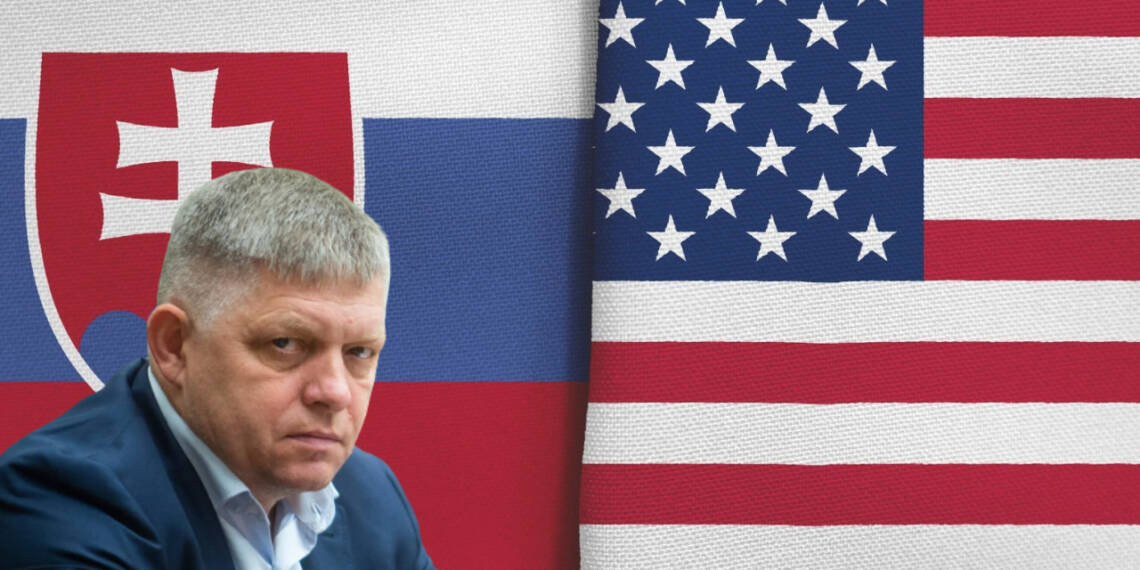In recent times, the United States has been observed intervening in the elections of various adversaries, shaping political landscapes to its advantage. A similar scenario is unfolding in Slovakia, where concerns arise about foreign influence.
Putin’s Ally in US Crosshairs
Slovakia is on the brink of a pivotal national parliament election on September 30, after experiencing political instability for five years. The upcoming 2023 Slovak elections might herald a shift in the country’s stance toward Ukraine, indicating a potential return to a pro-Russia orientation.
This prospect has raised concerns within the United States. Local opinion polls suggest that Slovakia’s former Prime Minister, Robert Fico, a Pro-Kremlin leader, is likely to regain power with his party, Smer-SD. Fico’s viewpoints often align with those of the Kremlin; he has criticized Ukraine and pledged to halt military aid shipments once back in office.
Fico opposes Ukraine’s NATO membership aspirations and EU sanctions against Russia. His anticipated victory signals a significant foreign policy shift for Bratislava, diverging sharply from the previous anti-Russia stance under Eduard Heger. Heger, the former Prime Minister, strongly supported Ukraine against Russian aggression. Fico’s resurgence reflects changing sentiments, raising concerns in the US. Consequently, the US is intervening in Slovakia’s elections, akin to its involvement in Hungary’s elections the previous year.

Read More: Another Pro-Russia European Nation Elects Pro-Russia Leader
US Dollars Fuel Slovak Elections
The upcoming parliamentary election campaign in Slovakia is experiencing a phenomenon akin to what’s been humorously referred to as “rolling dollars” in Hungary. US Ambassador Gautam Rana has acknowledged funneling millions of dollars into efforts aimed at suppressing social media accounts belonging to national conservative politicians, according to reports by the Slovakian news portal Hlavné Správy.
“I finally know who arranged for me to lose Facebook!”, wrote Ľuboš Blaha, a center-right opposition politician in telegram. He quoted Gautam Rana, US Ambassador to Slovakia, who has revealed that under the auspices of fighting what he called “Russian disinformation”, the Biden administration is actively financing the silencing of certain voices in Slovakia.
Rana stated, “We have provided $5 million to the Slovak Ministry of Defense. It will go towards countering Russian influence. Last year, we were able to cooperate between the Slovak government and the US government in bringing information to Facebook, where Facebook decided that MP Lubos Blaha should not be given a platform because he was such a notorious spreader of lies and misinformation,” in an interview for the newspaper SME, linked to the George Soros media empire.
Blaha, a vocal MP from the largest opposition party SMER Social Democracy, expressed his outrage at Facebook’s recent removal of his personal page, labeling the situation an “incredible scandal.” The ambassador’s open admission that the US sends millions of dollars to restrict Slovak citizens on social media and target the opposition has raised significant questions and concerns within Slovakia.
Russian Intel: US Blackmails Slovaks for Election Win
Meanwhile, the Russian Foreign Intelligence Service (SVR) has accused the US of extensive interference in Slovakia’s upcoming parliamentary election. In a press release, SVR director Sergey Naryshkin alleged that the US is resorting to tactics such as blackmail, threats, and bribery to ensure the victory of the incumbent government.

According to SVR, the opposition, which has expressed reluctance to follow US directives, stands a good chance of winning the election. The agency claimed that the US State Department has instructed European allies to engage in targeted efforts with local political and business circles to influence the election outcome.
Furthermore, the SVR asserted that the leader of the Progressive Slovakia party, Michal Simecka, has been directed by the US to form a cabinet loyal to Washington if his party wins. The SVR’s statement challenges the democratic integrity of the upcoming Slovak election, raising concerns about external influence on the electoral process.
Read More: Slovakia’s interim government and annexation chances
It’s important to note that Slovakia, a NATO member, has been involved in supporting Ukraine militarily. However, former Prime Minister Robert Fico, who might return to power, has indicated his intention to cease this aid and has questioned the necessity of economic measures against Moscow, potentially altering Slovakia’s foreign policy stance if he wins the election.
The evolving political scenario in Slovakia has stirred concerns in the US. America’s history of election interference is well-documented, often aiming to curb growing Russian influence and foster pro-Western sentiments. The recent allegations of US involvement in Slovakia’s election underscore the persistent influence attempts by major global players, highlighting the web of power struggles on the world stage.
Watch More:








